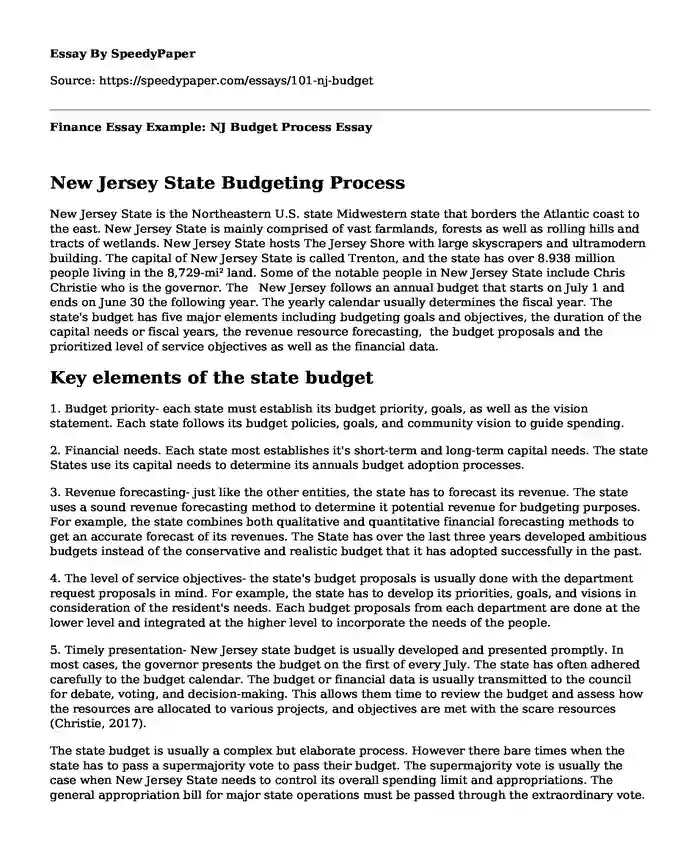
| Essay type: | Process essays |
| Categories: | Finance Government Budgeting |
| Pages: | 3 |
| Wordcount: | 761 words |
New Jersey State Budgeting Process
New Jersey State is the Northeastern U.S. state Midwestern state that borders the Atlantic coast to the east. New Jersey State is mainly comprised of vast farmlands, forests as well as rolling hills and tracts of wetlands. New Jersey State hosts The Jersey Shore with large skyscrapers and ultramodern building. The capital of New Jersey State is called Trenton, and the state has over 8.938 million people living in the 8,729-mi² land. Some of the notable people in New Jersey State include Chris Christie who is the governor. The New Jersey follows an annual budget that starts on July 1 and ends on June 30 the following year. The yearly calendar usually determines the fiscal year. The state's budget has five major elements including budgeting goals and objectives, the duration of the capital needs or fiscal years, the revenue resource forecasting, the budget proposals and the prioritized level of service objectives as well as the financial data.
Key elements of the state budget
1. Budget priority- each state must establish its budget priority, goals, as well as the vision statement. Each state follows its budget policies, goals, and community vision to guide spending.
2. Financial needs. Each state most establishes it's short-term and long-term capital needs. The state States use its capital needs to determine its annuals budget adoption processes.
3. Revenue forecasting- just like the other entities, the state has to forecast its revenue. The state uses a sound revenue forecasting method to determine it potential revenue for budgeting purposes. For example, the state combines both qualitative and quantitative financial forecasting methods to get an accurate forecast of its revenues. The State has over the last three years developed ambitious budgets instead of the conservative and realistic budget that it has adopted successfully in the past.
4. The level of service objectives- the state's budget proposals is usually done with the department request proposals in mind. For example, the state has to develop its priorities, goals, and visions in consideration of the resident's needs. Each budget proposals from each department are done at the lower level and integrated at the higher level to incorporate the needs of the people.
5. Timely presentation- New Jersey state budget is usually developed and presented promptly. In most cases, the governor presents the budget on the first of every July. The state has often adhered carefully to the budget calendar. The budget or financial data is usually transmitted to the council for debate, voting, and decision-making. This allows them time to review the budget and assess how the resources are allocated to various projects, and objectives are met with the scare resources (Christie, 2017).
The state budget is usually a complex but elaborate process. However there bare times when the state has to pass a supermajority vote to pass their budget. The supermajority vote is usually the case when New Jersey State needs to control its overall spending limit and appropriations. The general appropriation bill for major state operations must be passed through the extraordinary vote.
Special Veto power by the governor
In New Jersey, the governor has veto power that can last up to three weeks before h sings or even veto legislation. The governor can take weeks to veto legislation after the legislative council has passed it. The allowable time is 60 days for governors to review the bill before signing it. For example, in 2016, the governor exercised his power to amend the legislation that included modifying the state's criminal penalties related to the possession of small amount of marijuana. However, it is important to note that three-fifths of the legislative votes are needed to override the veto power. The governor of New Jersey can, therefore, reject the individual section of the bill, legislation and well as appropriation bill (Nj.gov, 2017).
Units responsible for directing budget preparation
The governor’s staff and the governor's Office of Management and Budget and the other agency manager are responsible for a bill passed by the legislature (Nj.gov, 2017).
The number of appropriation bills passed
The state has no specific number of appropriation bills, but the appropriation bills are limited to the subjects of appropriation. Most bills remain in a state of limbo after passing the second reading stage.
References
Christie, C. (2017). New Jersey state budget and finances - Public Policy in New Jersey. Ballotpedia.org. Retrieved 16 January 2017, from https://ballotpedia.org/New_Jersey_state_budget_and_finances
Nj.gov,. (2017). Office of Management and Budget (OMB) Publications. Nj.gov. Retrieved 16 January 2017, from http://www.nj.gov/treasury/omb/publications/16budget/index.shtml
Cite this page
Finance Essay Example: NJ Budget Process. (2018, Feb 08). Retrieved from https://speedypaper.com/essays/101-nj-budget
Request Removal
If you are the original author of this essay and no longer wish to have it published on the SpeedyPaper website, please click below to request its removal:
- Essay Example: Current Study on the Effects of the Minimum Wages on Employment
- Essay Sample with Analysis of Journal Article
- Free Essay on Leadership Challenges in 21st Century Businesses
- Literary Essay Sample: Characters Relationship in The Crucible by Arthur Miller
- Smartphones and Our Abilities to Solve Problems - Essay Example
- Research Paper Sample on Irish American Culture
- Paper Example. Serotonin Norepinephrine Reuptake Inhibitors Drug
Popular categories




